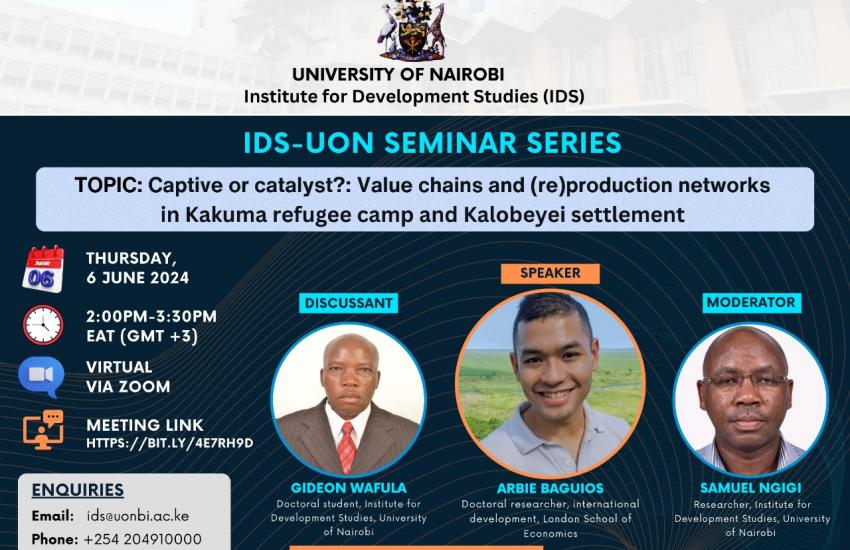IDS seminar on “Captive or catalyst?: Value chains and (re)production networks in Kakuma refugee camp and Kalobeyei settlement”
The Institute for Development Studies on Thursday 06th June 2024 (2pm-3.30pm EAT) held an online seminar themed “Captive or catalyst?: Value chains and (re)production networks in Kakuma refugee camp and Kalobeyei settlement”. The presenter was Arbie Baguios. Arbie is a doctoral researcher in international development at the London School of Economics. He is also the founder of Aid Re-imagined, an initiative that provides critical research and advocacy towards a more ethical and equitable aid system. He has previously worked for various international organisations including ActionAid, Save the Children, and the Red Cross.
Dr. Sam Ngige of IDS moderated the session, while Gideon Wafula, a doctoral student at IDS-UON, was the discussant.
The Research Abstract reads as below:
Can markets foster refugee self-reliance? In Kenya, the government-led Kalobeyei (and Kakuma) Integrated Socio-economic Development Plan (KISEDP) has so far invested USD 820 million towards predominantly “market-based solutions” for 250,000 refugees (in addition to host community members) aimed at promoting self-reliance. Meanwhile, critics argue this increasing “marketisation” is a neoliberal shirking of humanitarian responsibility towards refugees. Arbie’s research looks at two market systems – the agricultural and digital value chains – to ask: how do markets shape refugee self-reliance? His initial findings point to a nuanced role of markets, and a critical re-assessment of the idea of “self-reliance.”
The presentation highlighted that as of 2024 Kenya hosted 770,255 refugees and asylum seekers. And 285,238 of them were in Kakuma and Kalobeyei settlements. Only 1,124 of those are resettled or repatriated. In the camps, they face poor employment, financial hardship, inadequate public services, and inequality (social inequality, income inequality etc.).
This research was driven by “the shift from humanitarianism to market-oriented approach, and scholarship in response to the increasing ‘marketisation’ of refugee camps which sees it as transforming camps into capitalist frontiers that leads to neoliberal neglect.”
The literature review covered diverse views: conservative, mainstream, and critical views concerning refugees, the refugee economy, the market and self-reliance of refugees, and the solutions. For instance, the conservative view posits that refugees are a burden that poses economic, political, and security threats, while the mainstream view is that refugees are surplus labour whose productivity can contribute to economic development. In contrast, the critical view holds that refugees are disposable populations exploited under neoliberalism.
The Research Questions included: How did markets emerge in Kakuma and Kalobeyi Settlement? Do the emergent market systems - specifically the vegetable and digital value chains/ (re)production networks – promote or impede refugees’ self-reliance?
The research focused on vegetable value chain and digital production.
Initial findings on institutional domains such as property rights showed that while refugees are not allowed to own property, there is clandestine market shift from communal property rights to individual ownership through different arrangements with the Turkana. On credit, refugees are excluded from the credit market because of requirements such as IDs and distrust. They resort to lending from friends and relatives. They also have self-organized savings and loans associations.
The discussant raised questions of bias on the part of the researcher. He also questioned if the focus was only on formal markets, given that a lot also happens in informal markets, especially in refugee camps. Wafula also noted that Arbie has not set straight how he intends to measure self-reliance.


